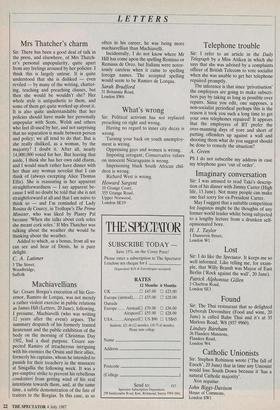Machiavellians
Sir: Cesare Borgia's execution of his Gov- ernor, Ramiro de Lorqua, was not merely a rather violent exercise in public relations as James Hill (Letters, 20 June), following, I presume, Machiavelli (who was writing 12 years after the event) argues. The summary despatch of his formerly trusted lieutenant and the public exhibition of the body on the morning of Christmas Day 1502, had a dual purpose. Cesare sus- pected Ramiro of treacherous intriguing with his enemies the Orsini and their allies, formerly his captains, whom he intended to punish for their treachery in the massacre at Sinigallia the following week. It was a pre-emptive strike to prevent his rebellious condottieri from getting wind of his real intentions towards them, and, at the same time, a subtle demonstration of the fate of traitors to the Borgias. In this case, as so often in his career, he was being more machiavellian than Machiavelli.
Incidentally, I do not know where Mr Hill has come upon the spelling Remisso or Remissa de Orco, but Italians were notor- iously careless when it came to spelling foreign names. The accepted spelling would seem to be Ramiro de Lorqua. Sarah Bradford
31 Britannia Road, London SW6


















































 Previous page
Previous page